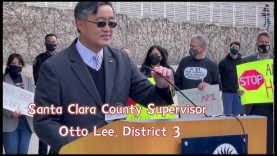Asian American Group Receives Nearly 3,800 Reports of Hate and Bias
The video is created by Ding Ding TV, Santa Clara County Supervisor Otto Lee, District 3 spoke at Rally to Stop AAPI Hate
Asian American Group Receives Nearly 3,800 Reports of Hate and Bias
From Voice of America
WASHINGTON – In Brooklyn, New York, a white man catcalled an Asian American woman and aggressively followed her down the block, yelling a racial obscenity and a sexually derogatory term.
In Washington, D.C., a man punched an Asian woman in the back in a Metro subway station, repeatedly shouting racial expletives and physically threatening her and her boyfriend.
In Las Vegas, a ride-sharing service driver told his Asian passenger, “Damn, another Asian riding with me today. I hope you don’t have any COVID.”
The three incidents are among nearly 3,800 firsthand accounts of anti-Asian hate and abuse an advocacy coalition has recorded since the start of the COVID-19 pandemic a year ago. The disease originated in China.
In a new report released Tuesday, Stop AAPI Hate said it recorded 3,795 anti-Asian hate incidents between March 19, 2020 – shortly after COVID-19 was declared a pandemic – and February 28, 2021. More than 500 of the incidents were recorded in 2021.
“The number of hate incidents reported to our center represent only a fraction of the number of hate incidents that actually occur, but it does show how vulnerable Asian Americans are to discrimination,” the group said in a statement.
Verbal harassment and shunning made up 68.1% and 20.5% of the incidents, respectively. Physical assaults constituted 11.1% of the total incidents.
Stop AAPI Hate was launched a year ago by a coalition of two Asian American advocacy groups and a university department to help Asian Americans report hate incidents during the pandemic.
Asian Americans started reporting an increase in discrimination as early as January 2020. But the number surged as former President Donald Trump began using xenophobic language such as “kung flu” to refer to the coronavirus and blaming China for the pandemic, Stop AAPI Hate co-founder Cynthia Choi said.
The majority of the incidents recorded by Stop AAPI Hate are not hate crimes, which the FBI defines as criminal offenses motivated by race, religion, sexual orientation and other factors, Choi said.
However, as VOA previously reported, anti-Asian hate crimes last year soared by 150% in major U.S. cities, and the violence has continued into this year.
In January, Vichar Ratanapakdee, an 84-year-old immigrant from Thailand, died after being knocked to the ground in his San Francisco neighborhood. A suspect was later arrested and charged with murder.
The administration of President Joe Biden has taken a stand against the hate epidemic, with Biden issuing a memorandum in January condemning the surge in anti-Asian hate crimes.
Choi said that while Asian American rights organizations welcomed the largely symbolic gesture, they want to see it matched by action.
While the incidents reported to Stop AAPI Hate took place in all 50 states and the District of Columbia, California — the state with the largest Asian American population — accounted for 45% of the incidents. New York, home to the second largest Asian community, accounted for 14%.
Chinese Americans were the most frequently targeted group, reporting 42.2% of the incidents, followed by Koreans, 14.8%; Vietnamese, 8.5%; and Filipinos, 7.9%, according to the report. Women were more than twice as likely as men to report incidents.
The woman attacked in the Washington Metro station told Stop AAPI Hate that the incident took place on an escalator at a transfer station.
“A few days later, we saw a news story about how the owner of Valley Brook Tea in D.C. was harassed and pepper-sprayed by the same man, calling him ‘COVID-19’ repeatedly,” the woman reported.
No arrest was made in the case. The Metropolitan Police Department closed the case after the U.S. Attorney’s office declined to bring charges, according to an MPD spokeswoman.
In response to the surge in anti-Asian violence, the Justice Department said last month that since the start of the Biden administration, it has trained hundreds of federal prosecutors and law enforcement officers to identify, investigate and prosecute hate crimes and other civil rights crimes.
“I want to be clear here: No one in America should fear violence because of who they are or what they believe,” acting Deputy Attorney General John Carlin said during a press call last month.
亚裔美国人团体收到近3800份仇恨和偏见事例报告
美国之音,华盛顿 —
在纽约市的布鲁克林,一名白人男子对着一名亚裔美国妇女叫骂,并在街区里咄咄逼人地尾随其后,冲着她大喊“中国佬”和一个带有性贬义的词语。
在首都华盛顿,一名男子在一个地铁车站朝一名亚裔女子的后背打了一拳,并不断高喊“中国婊子”,并对她和她的男友进行了人身威胁。
在拉斯维加斯,一名拼车服务司机对他的亚裔乘客说,“该死,今天又有一名亚洲人坐我的车,我希望你没有新冠病毒。”
据一个亚裔美国人倡导组织联盟称,自一年前新冠疫情最初从中国开始以来,有近3800份针对亚裔美国人的仇恨和侵权的第一手报告,包括这三起事件。
在周二(3月16日)发布的一份新报告中,“停止针对亚太裔的仇恨” (Stop AAPI Hate)报告中心表示,在2020年3月19日,即新冠病毒疾病被宣布为国际大流行病后不久,至2021年2月28日期间,它记录了3795起反亚裔人的仇恨事件。这些事件中的500多起发生在2021年。
“向我们中心报告的仇恨事件只是实际发生的仇恨事件的一小部分,但它确实表明亚裔美国人是多么容易受到歧视,” “停止针对亚太裔的仇恨”报告中心 说。
“停止针对亚太裔的仇恨”报告中心是一年前由三个亚裔美国人团体组成的联盟发起的,旨在帮助亚裔美国人报告疫情期间的仇恨事件。
亚裔美国人权益倡导者表示,这股仇恨浪潮的部分导火线是前总统特朗普频繁使用“功夫流感”(kung flu)来等排外语言来指代冠状病毒。
今年1月,美国总统拜登发布了一份备忘录,谴责自疫情开始以来针对亚裔的仇恨犯罪的激增。
言语骚扰和闪避分别占这些事件总数的68.1%和20.5%,而人身攻击则占事件总数的11.1%。
虽然报告的事件发生在美国所有50个州和首都华盛顿,但亚裔美国人口最多的加利福尼亚州占了所有事件的45%。第二大亚裔社区所在的纽约占14%。
这份报告称,华裔美国人是最经常受到攻击的群体,他们报告了42.2%的事件,其次是韩裔(14.8%)、越南裔(8.5%)和菲律宾裔(7.9%)。女性报告事件的可能性是男性的两倍以上。
在华盛顿地铁站遇袭的那名女子告诉“停止针对亚太裔的仇恨”说 ,这起事件发生在地铁中转站的一个自动扶梯上。
“几天后,我们看到了一个新闻报道,说华盛顿市‘茗觉茶庄’(Valley Brook Tea)业主是如何被同一名男子骚扰并被喷洒胡椒剂,那名男子一再称茶庄业主是‘新冠病’”,这位女士报告说。
此案没有逮捕任何人。据华盛顿市警察局的一位发言人说,在联邦检察官办公室拒绝提出指控后,华盛顿市警察局将此案做了结案处理。
虽然大多数报告给“停止针对亚太裔的仇恨” 的事件并没有上升到仇恨犯罪的级别,但最近几周发生的一系列针对亚裔的暴力事件已经让倡导人士感到震惊,并在全美各地引发了抗议活动。
联邦调查局将仇恨犯罪定义为受到种族、宗教、性取向和其它因素驱使的刑事犯罪行为。这些犯罪的例子包括攻击行为和破坏财物。
今年1月,84岁的泰国移民维查·热塔纳帕克迪(Vichar Ratanapakdee)在他所在的旧金山社区被人恶毒的击倒在地后死亡。一名嫌疑人后来被捕并被控谋杀。
针对反亚裔暴力事件的激增,司法部上个月表示,自拜登总统的政府上任之初,司法部已经培训了数百名联邦检察官和执法人员,以识别、调查和起诉仇恨犯罪和其他民权犯罪。
上个月,司法部代理常务副部长约翰·卡林(John Carlin)在一次新闻发布会上说:“我想在这里清楚地表明:在美国,没有人应该因为他们的身份或信仰而害怕暴力。”
The above content is from Voice of America, Please contact Diana@dingdingtv.com for copy right issues.





